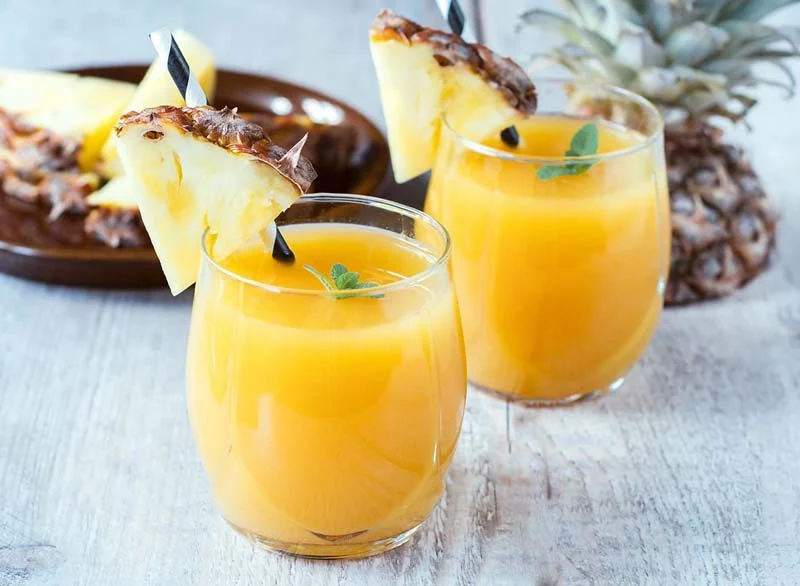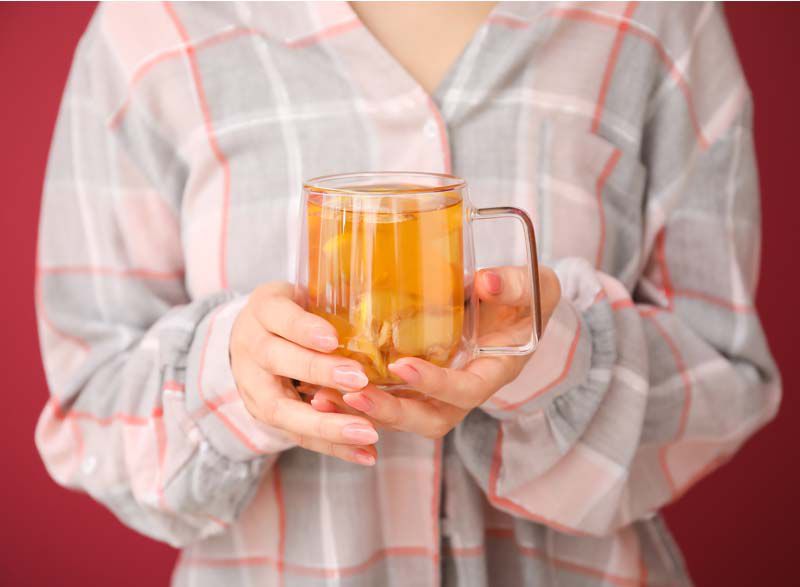![[feature] Drinks That Will Reduce Inflammation](https://blogger.googleusercontent.com/img/b/R29vZ2xl/AVvXsEg2_1LupPaoyOix-ov9N5xBKq0RnL-g4aUjj1wI9-kc0jdgqKXpBJNR2CvOym4BHXWTl4PVnYTl-n7rGKNj97mIQRw9RET5E5HiSKNghJCNpLLeSkx77XpETbd0HtBw3yqBsVOWf_pNIe7CYQDuqJ-yErN5rSdfFjyJP7DBfGYgkByuvc7AIHi4SBMFYg/s16000-rw/woman-holding-tea-lemon-ginger.jpg) |
| Ⓒ Provided by Eat This, Not That! |
By Jeff Csatari, Eat This, Not That!
Need a refresher on chronic low-grade inflammation? We figured because it's a silent problem with few easy-to-recognize symptoms, just like high blood pressure. Think weight gain, fatigue, joint pain, skin problems, and digestive issues, for starters. Any number of problems can cause these symptoms and one of them could be chronic low-grade inflammation, that is, when your body's immune system pumps out inflammatory substances as a way of dealing with injury and disease. It's the bad side of a good thing.
A short-term inflammatory immune response helps us fend off an attack. It's not good when the inflammation lasts long term and is triggered by poor lifestyle choices. Over time, chronic inflammation harms our cells.
Since chronic low-grade inflammation is so closely tied to the stuff we bring into our bodies like tobacco smoke, chemicals, red meat, alcohol, sugary and fried and highly processed foods, changing lifestyle habits is an effective way to cool our inflammation. And one of the easiest ways to start is by choosing beverages that science has shown will reduce inflammation.
Read More: What Is An Anti-Inflammatory Diet? Here's Exactly What You Need To Know
Pineapple Juice
 |
| Ⓒ Provided by Eat This, Not That! |
One of the most researched and most powerful anti-inflammatories is bromelain, an enzyme found in abundance in pineapple. A review of studies on bromelain in the journal Foods in 2021 explored its many possible therapeutic effects for the treatment of cancer, burns, cardiovascular disease due to its anti-coagulant properties, allergies, sinusitis, and arthritis. One reason bromelain is so effective is that it has a high bioavailability, meaning it is absorbed quickly by the body and remains potent for a significant amount of time.
Studies have shown that bromelain produces both analgesic and anti-inflammatory effects in patients with rheumatoid arthritis and reduces knee pain and inflammation in patients with osteoarthritis. Pineapple juice taken after exercise may even relieve post-exercise inflammation by helping to repair and ease muscle soreness because it is also rich in potassium.
While all parts of the pineapple contain bromelain, most of this magical compound is found in the stem. Because the stem is a little on the tough side, you can blend or juice the core with the sweeter flesh to make a delicious anti-inflammatory elixir.
Warm Turmeric Milk
 |
| Ⓒ Provided by Eat This, Not That! |
Turmeric is a yellowish-orange spice containing a powerful anti-inflammatory compound called curcumin, which has been shown to help reduce the risk of many chronic diseases as well as relieve inflammatory pain from osteoarthritis. In one 2019 study of turmeric's effectiveness, 139 patients with knee osteoarthritis were split into two groups. One group took a turmeric capsule three times a day while the other group took a 50-milligram tablet of the non-steroidal anti-inflammatory drug diclofenac twice a day. After 14 and 28 days, all the patients were scored for pain severity. The researchers found that the natural spice was just as effective as the popular NSAID at reducing knee pain and inflammation and resulted in fewer adverse side effects. Other studies show that turmeric is effective at reducing the inflammation that causes colitis.
Turmeric powder is easy to mix into smoothies and it also makes a pleasing tea. But since curcumin is absorbed better by the body when taken with some fat, adding milk or avocado to your turmeric smoothie is a smart option.
Or try warm turmeric milk made with almond milk and coconut oil (for the fat). Whisk the following ingredients into a saucepan, bring to a boil, then turn down the heat and simmer for 10 minutes: 2 cups unsweetened almond milk, 1 Tbsp. honey (optional), 1 Tbsp coconut oil, 1 tsp ground turmeric, 1 tsp ground cinnamon, a pinch of black pepper, and freshly grated ginger. Makes 2 servings.
Green Tea
 |
| Ⓒ Provided by Eat This, Not That! |
Green tea is one of the healthiest beverages you can drink. "Green tea is packed with disease-fighting antioxidants, as well as the antioxidant EGCG, which research shows can enhance fat burning and increase metabolism," say Eatthis.com medical board members Tammy Lakatos Shames, RD, CDN, CFT and Lyssie Lakatos, RD, CDN, CFT, the Nutrition Twins.
Among the best variations of green tea is matcha, which contains a higher concentration of epigallocatechin gallate (EGCG), which is also one of the most potent anti-inflammatory polyphenols. A number of studies have suggested that drinking matcha green tea may reduce symptoms of various inflammatory disorders.
In one 2022 report in the journal Food Science and Human Wellness, researchers say green tea polyphenols strengthen the epithelial barrier in the gut and support the healthy composition of gut microbes, which improves outcomes for patients suffering from inflammatory bowel disease (IBD).
Bone Broth
 |
| Ⓒ Provided by Eat This, Not That! |
No doubt you've used bone broth as stock for soups. And you've probably sipped it in a steaming mug on a cold winter day. The broth made from simmering the bones and connective tissues of chickens, cattle, and other animals has become a health elixir due to its concentration of nutritious minerals, vitamins, and amino acids, which support a healthy gut microbiome.
"Our best line of defense against chronic inflammation is the health of our gut," says Samantha Presicci, MSN, RD, LD, a registered dietitian at Fond Bone Broth. Poor gut health can lead to a condition known as "leaky gut," which is characterized by a compromised lining of the gut that allows unhealthy substances to leak into your bloodstream, triggering inflammation, according to a review in the journal Gut. Bone broth is rich in collagen, gelatin, glycine, glutamine, and hydroxyproline, all of which have numerous clinical studies suggesting their ability to reduce inflammation.
"Collagen helps to nourish the intestinal lining, and gelatin is able to absorb water and help maintain the layer of mucus that keeps gut microbes away from the intestinal lining," Presicci says. "Bone broth is easy for a damaged gut to digest and absorb, allowing you to reap the benefits of its amino acids and minerals for healing." Other studies suggest that collagen, gelatin, chondroitin, and glucosamine from bone broth also work together to decrease the inflammation in joints that causes arthritis.
Read More: 4 Foods That Cause DNA-Damaging Inflammation in Your Body
Ginger Tea
 |
| Ⓒ Provided by Eat This, Not That! |
Steep some fresh ginger root in hot water to cool chronic inflammation. The tasty spice has been used for thousands of years to soothe upset stomachs and nausea and reduce pain. According to the Arthritis Foundation, it may also be a natural way to lessen soreness from inflamed joints. A University of Miami study compared the effects of ginger extract to a placebo in 247 patients suffering from osteoarthritis of the knee and found that the ginger reduced pain and stiffness by 40% more than the placebo. In addition to its anti-inflammatory properties, researchers say it also works as an analgesic.
Tart Cherry Juice
 |
| Ⓒ Provided by Eat This, Not That! |
The juice of tart cherries has been shown to be beneficial for reducing the risk of cardiovascular disease because studies indicate it can lower blood pressure and LDL (bad) cholesterol. A 2019 study in the journal Nutrients suggests that the heart-healthy effects on blood pressure and cholesterol may be attributed in part to the juice's antioxidant and anti-inflammatory properties. In a small randomized controlled clinical trial, 37 men and women ages 65 to 80 were assigned to drink either 2 cups of tart cherry juice or a control drink every day for 12 weeks. At the end of the 12 weeks, blood samples were taken, and researchers found that only those subjects who drank the cherry juice lowered levels of inflammation markers, including c-reactive protein, compared to the control group.
See more at Eat This, Not That!






















